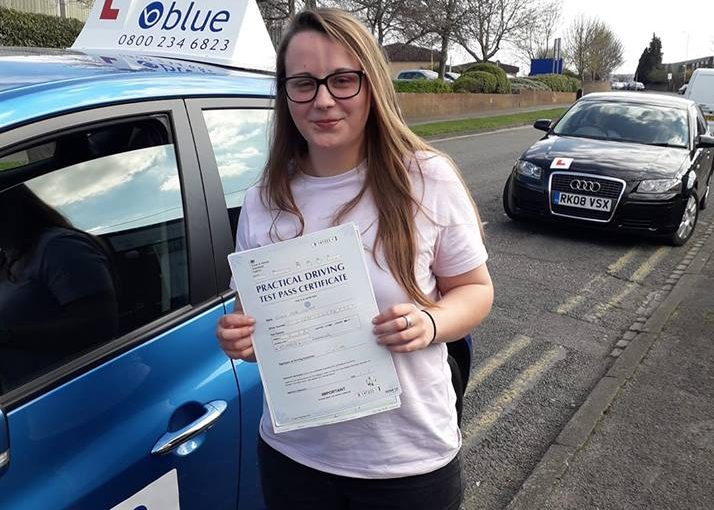
Reading Driving Test pass for Emily Fisher
Posted in: Driving Lesson Reading, Learner Drivers Passing Test.
Congratulations to Emily Fisher, who passed her practical test today with only 3 driver faults. The examiner added in her debrief that it was a very nice drive. Well done, take care and drive safely fro Steve Martin and the team at Blue.
Blue Driving School Driving Tips
Meeting Traffic
Meeting approaching traffic – with the exception of very narrow roads meeting traffic will mainly be where there are obstacles in the road (most of the time parked cars) and you have oncoming vehicles.
Priority
As a general rule if the obstruction is on your side of the road oncoming vehicles have priority. As well as parked cars you may have road works, traffic calming measures, a skip etc., Any time that you continue with obstructions on your side then to do so you must not cause oncoming vehicles to need to change speed or direction.
Be prepared to sacrifice priority when you’re not sure if oncoming drivers are going to let you through (where the obstruction is on their side).
Try not to leave it too late when deciding on your cause of action so that you do not find yourself coming to a sudden stop or proceeding too fast.
Clearance
Try and give a car doors clearance when passing parked cars – you should be able to do this when there are no oncoming vehicles or if the road is wide enough that oncoming traffic is not affected.
Give cyclists – motorcyclists – horseriders plenty of room when passing. Give cyclists enough room where possible so that if they fell off you would still avoid them – in particular when:
• It’s a windy day
• The cyclist is a young child
• The cyclist was travelling up a hill
If a cyclist looks over their shoulder they may be about to turn right or move out to pass an obstruction.
On approach follow the M-S-P-S-L routine
Mirrors
Check your mirrors well before changing speed or direction. Here you will be
doing both – you will need to move over to the right to pass the red car which is
parked up and as the obstruction is your side of the road you may need to stop.
Signal
Consider a signal and indicate right only if you think anyone will benefit.
Your road position and speed will also confirm your intentions.
Position
Position – move over to the centre of the road where possible on approach.
Speed – approach slow enough to allow you to come to a nice, smooth stop if
needed (if you’re not sure there is enough room for both you and any oncoming
traffic). The slow down and anticipate, the oncoming traffics intentions.
Speed
If you need to stop, your position will confirm your intentions aim to keep a
reasonable clearance from the obstruction as well as maintaining a good view
of the road ahead, this is referred to as a ‘hang back’ or ‘hold back’ position.
Look
You don’t want to look like you are parking up (if you are too far to the left!).
Move off safely as soon as clear. M-S-P-S-L routine. Occasionally a blind spot
check may be needed and you should consider a signal – applying if you think
anyone will benefit.
Where you have obstructions on a narrow road
Flashing lights
Some people may flash their headlights as a sign they are willing for you to
proceed, judge their speed and position to confirm their intentions to let you
through. The true meaning of flashing headlights are for ‘a warning of
presence’ so be sure of their intentions – they may not have been flashed at
you or possibly done by mistake. As this is the true meaning of flashing your
headlights do not use to beckon people on
Traffic calming measures
To slow the traffic down in housing areas and near schools etc. where
otherwise traffic may go too fast. They are also located where there is simply
only room for one vehicle to pass at a time i.e. through a narrow tunnel
Equal Priority
Slow down and assess the oncoming vehicles speed and
position to help judge their intentions, be more willing to hold
back for oncoming traffic as you will be able to control the
situation and not rely on other people. Be more willing to give
way to traffic travelling up a hill, especially larger vehicles
Tags: Reading Driving Test pass for Emily Fisher